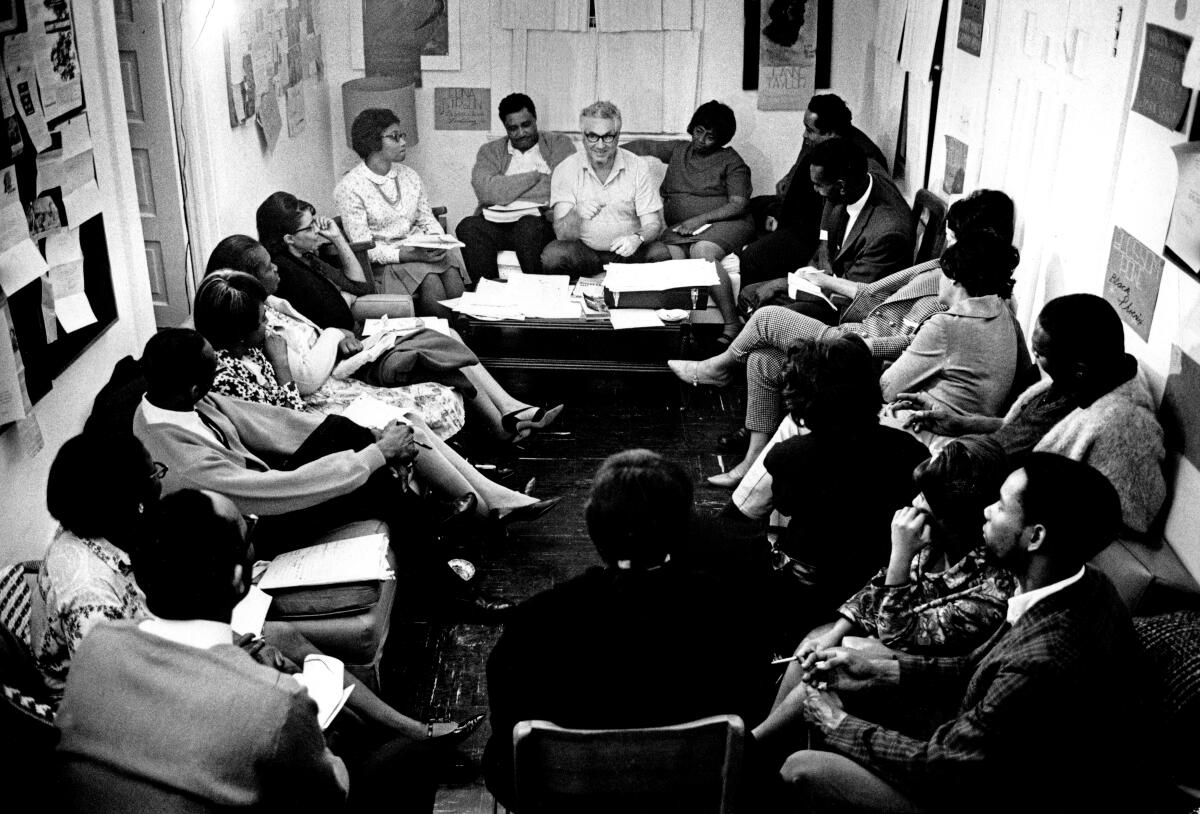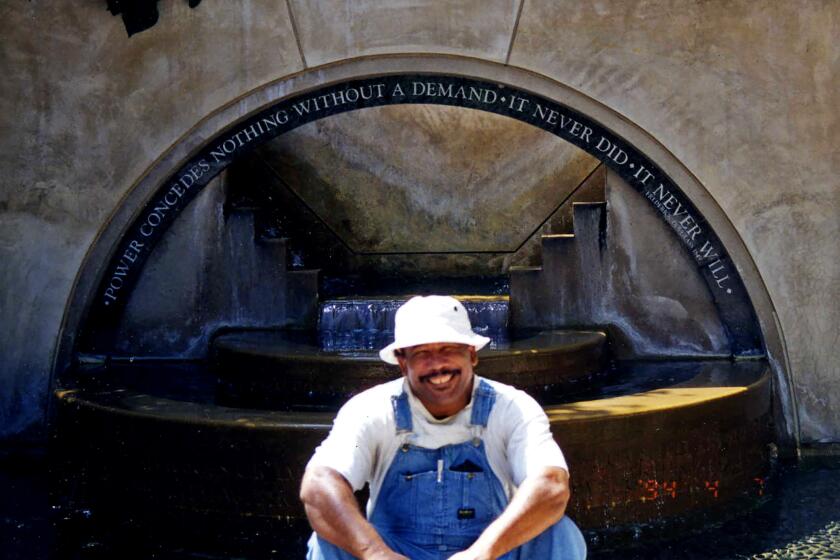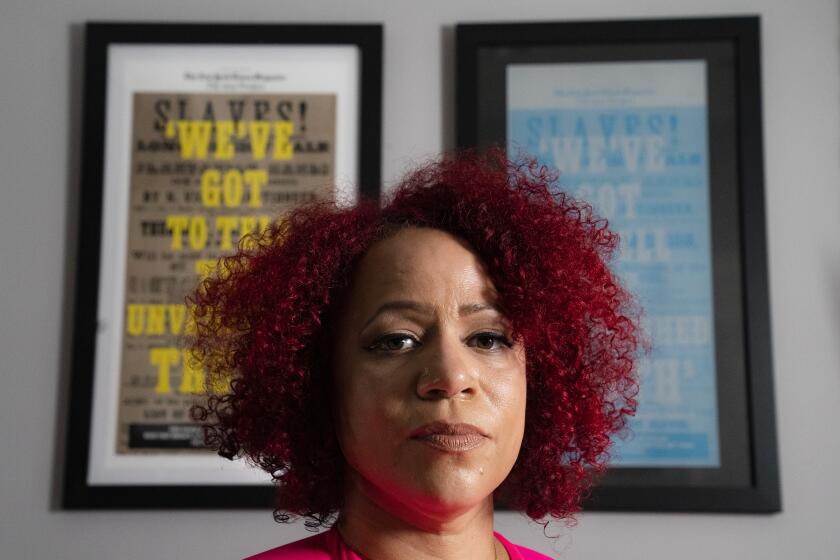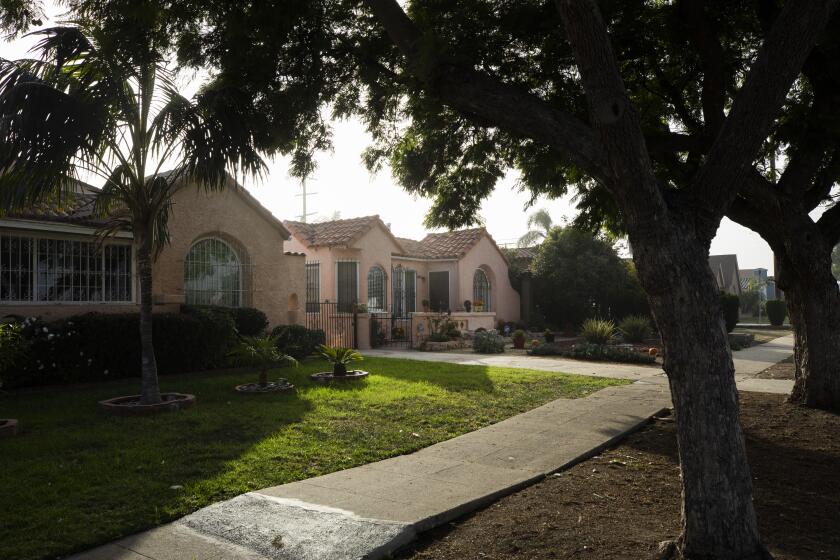Opinion: Why Louise Jenkins Meriwether, the Black author and activist, should be a household name

- Share via
The woman whose work helped usher in my lifelong dream of becoming an author died last week.
Louise Jenkins Meriwether, born May 8, 1923, in Haverstraw, N.Y., was beloved by her more famous contemporaries and friends, including James Baldwin and Paule Marshall, and her masterful debut novel, “Daddy Was a Number Runner” (first published in 1970), sold more than 400,000 copies, the scholar Nellie Y. McKay wrote.
Yet, unlike her peers Maya Angelou and Toni Morrison, Meriwether is not a household name. I’m embarrassed to admit that I had not read her work until I learned, in late 2019, that I was a finalist for an award the Feminist Press and Tayo Literary Magazine founded and named in her honor: the Louise Meriwether First Book Prize for women and nonbinary writers of color. The more I’ve uncovered about her, the more my connection to her has deepened, including how we both developed our writerly voices in Los Angeles.
Eric Priestley died on New Year’s Eve. He wasn’t exactly famous, but his poetry lives on.
“Daddy Was a Number Runner,” set in Harlem during the Great Depression, was among the first to center a young Black girl as a protagonist. The beautiful blend of tenderness and straightforwardness Meriwether used in shaping characters whose pride and faith in the face of poverty, racism and closed doors reminds me of members of my small-town Louisiana family.
But Meriwether helped me feel seen beyond race and class: Like me, she didn’t publish her first novel until she was almost 50, Audrey Edwards, an author and former Essence editor, told me. And, in my ongoing explorations of Meriwether’s life, I gleefully learned that, even though we were both transplants, Los Angeles paved the way to our debut books. Through community and commitment to her craft, she built a critical bridge of her writing life during her time living here in the 1960s — this city that drew me to its orb four decades later.
Unbeknownst to me, I was following the ghost of her footsteps — workshopping my early manuscript, pursuing a master’s degree, writing for local publications. Meriwether was a member of the famed Watts Writers Workshop, where she wrote and revised “Daddy Was a Number Runner.”
To quash the teaching of racism, books by Black writers are being banned. As a “hate the book, hate the writer” ethos takes hold, we’ve become targets.
I learned of her passing in the soft, dark hour before the chaos of getting my son up and out for school. I signed onto Facebook and saw Edwards’ tribute to her dear friend and mentor. Meriwether was 100 years old and had long returned to her native New York City, but somehow a secret hope that I would one day get to meet her had burrowed its way into my heart. I commented on Edwards’ post, closed my laptop and cried.
Those tears spilled feelings I could not put into words. How do you hold onto hope when, over the course of this brilliant woman’s century on Earth, any progress we thought we’d made rots away daily: Wars keep raging, artists and writers are increasingly censored and exploited, labor inequities run rampant in every industry and people are being slaughtered? But I sense that Meriwether, whose first name means “famous warrior” and who actively protested injustice, including apartheid and Ku Klux Klan violence, would want us all to keep on keeping on.
Our house off Slauson Avenue could go for double what we paid for it. Yet my husband and I have dreams for our family — and this neighborhood.
In Los Angeles, Meriwether completed a master’s degree in journalism at UCLA; worked as a reporter for the Los Angeles Sentinel; was hired as the first Black female story analyst by Universal Studios and participated in a protest of 20th Century Fox’s plans to produce a film based on William Styron’s “The Confessions of Nat Turner.”
Many Black leaders believed Styron’s book was a misrepresentation of Turner, who was convicted of a slave revolt and lynched in 1831, and that the film would be, too, McKay wrote. The studio dropped the project. I can hear the triumphant shouts of Meriwether and her colleagues in my mind, and it makes me think of today’s Writers Guild of America writers and their recent victory in fighting for fairer contracts from studio executives. Such movements underscore that activism and art are bedfellows, whether or not, like Meriwether, we choose to address inequities and unrest in our work.
During the uproar over the police murder of George Floyd, a 1957 photograph of Meriwether at a protest resurfaced in the social media universe. Meriwether is flanked by armed guards looming over her as she, dressed in an overcoat and smoking a cigarette, looks as unbothered as a cloudless day.
A warrior? Absolutely.
Famous? It’s up to us to make sure her legacy keeps on.
Cassandra Lane is editor in chief of L.A. Parent and author of “We Are Bridges: A Memoir.”
More to Read
A cure for the common opinion
Get thought-provoking perspectives with our weekly newsletter.
You may occasionally receive promotional content from the Los Angeles Times.













